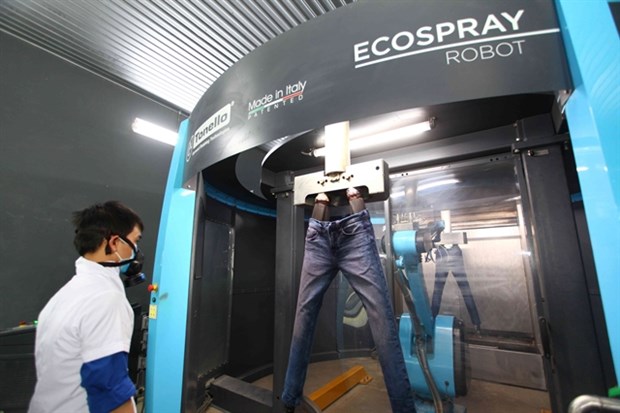
The digitalisation and technological transformation are speeded up during the COVID-19 pandemic. (Source: VNA)
Speaking to Vietnam News, Angus Liew, General Director of Gamuda Land Ho Chi Minh City, said: “Digitisation is the future of mankind, not only for real estate but also for all other business sectors, and people’s lifestyles as well. It’s an irreversible trend. Nowadays we can see everyone is talking about AI, industry 4.0, etc.”
Technology was the backbone nowadays and governed every aspect of doing business, from operational systems to mechanisms to interact with customers.
His company had put a lot of efforts and resources into developing technology and innovation. “Technological transformation is one of our top priorities,” he said.
Soon, possibly in the first quarter of 2022, Gamuda Land Vietnam planned to launch a mobile app, ‘GL Lifestyle.’
“This app is much more than just a technological product, it is itself an online ecosystem. Whatever features and services we have in our townships can be accessed through this app. It also connects our retailers and F&B, lifestyle and educational services with users.
“Training activities, conferences and seminars within our organisation are fully organised online. Proposals and approval procedures are proceeded with electronically, and applications and approvals can be done anytime, and from anywhere from any device whether you are in the office or at home.
“We have also fully processed procurement on digital platforms, including tendering, pitching and awarding.”
Gamuda had expanded sales on digital platforms soon after COVID first began. Customers could find property deals on the company’s website and the sales team assisted them in real time.
The company’s headquarter in Malaysia was focused on technology transformation.
“It helps to make our operational system more agile and smart than previously. Thanks to it, Gamuda Land has sustained itself through difficult times and overcome challenges.
“Technology helps keep our operations running, and allows us to achieve our goals though there are many interruptions in the supply chain.
“Considering IT the backbone of our business, we always have a weekly discussion about how technology can be upgraded to enhance our business performance and what new solutions can be applied to strengthen and improve our process.
“We will continue to develop our existing digital systems to make them smarter and friendlier to users. The solutions being developed at the Gamuda head quarter like enterprise resource planning, industrialised building system, digital engineering, data warehouse, etc. will soon be implemented in Vietnam.”
Recently Bibica Joint Stock Company launched digital retail platforms, connecting producers, distributors, retailers, and customers as part of a programme in response to the Ministry of Information and Technology’s digitisation and digital economy development efforts.
A highlight of the paltform is the rewards points alliance model to connect customers, stores, manufacturers, and other partners in the alliance.
Customers are able to receive rewards and gifts from Bibica and its partners.
As for sellers, they can reach a large number of customers through the platform.
This is the first model in the Vietnamese retail industry that takes care of customers and cross-marketing, according to the company.
It is very popular in Japan where 60 million members and nearly a million shops take part in it.
Truong Phu Chien, Chairman of Bibica, said his company was acutely aware of the role and importance of digital transformation, and constantly strives to increase the use of information technology in all its business activities.
“The new solution is meant for Bibica to quickly and directly assist distributors, agents at all levels and consumers with easily buying goods online amid the Government's strict social distancing directive to fight the epidemic.
“The pandemic has severely affected manufacturing and distribution across the board. This app is a practical step to help us take care of and support our agents and stores across the country at this difficult time. "
More and more individuals too are using technology in their daily lives for things like buying food and making cashless payment to avoid exposure to COVID.
A recent Visa report titled Consumer Payment Attitudes highlights a growing interest in digital banking and other new payment technologies.
It said digital banking has a strong following among Vietnamese consumers with 77 percent being aware of it and 31 percent actually using it.
The driver of adoption is the convenience of being able to bank at any time without having to visit a bank.
At the same time there is growing interest in emerging payment methods. Biometric payments using fingerprint scans, voice and facial recognition and retina scan are a subject of particular interest.
Eighty three percent of Vietnamese are now aware of the existence of these payment methods and a vast majority are also interested in trying them.
Numberless cards are also gradually gaining recognition with 62 percent of consumers now aware of the existence of this option and 77 percent saying they would use them.
“The COVID-19 pandemic has given a tremendous push for all forms of cashless payments across small-ticket categories,” said Dang Tuyet Dung, Country Manager for Visa Vietnam and Laos.
“These trends have found extremely fertile ground among Vietnam’s young and adaptable population, with Gen Z consumers showing significant trust and excitement in new payment services and consumption channels like social commerce.”
The significant interest shown in digital payments would help drive adoption and put Vietnam on the path to a cashless society, providing advances in safety, security and convenience, the Visa study said./.
VNA
 Da Nang invests over 200 billion VND in semiconductor chip design, AI development
Da Nang invests over 200 billion VND in semiconductor chip design, AI development



